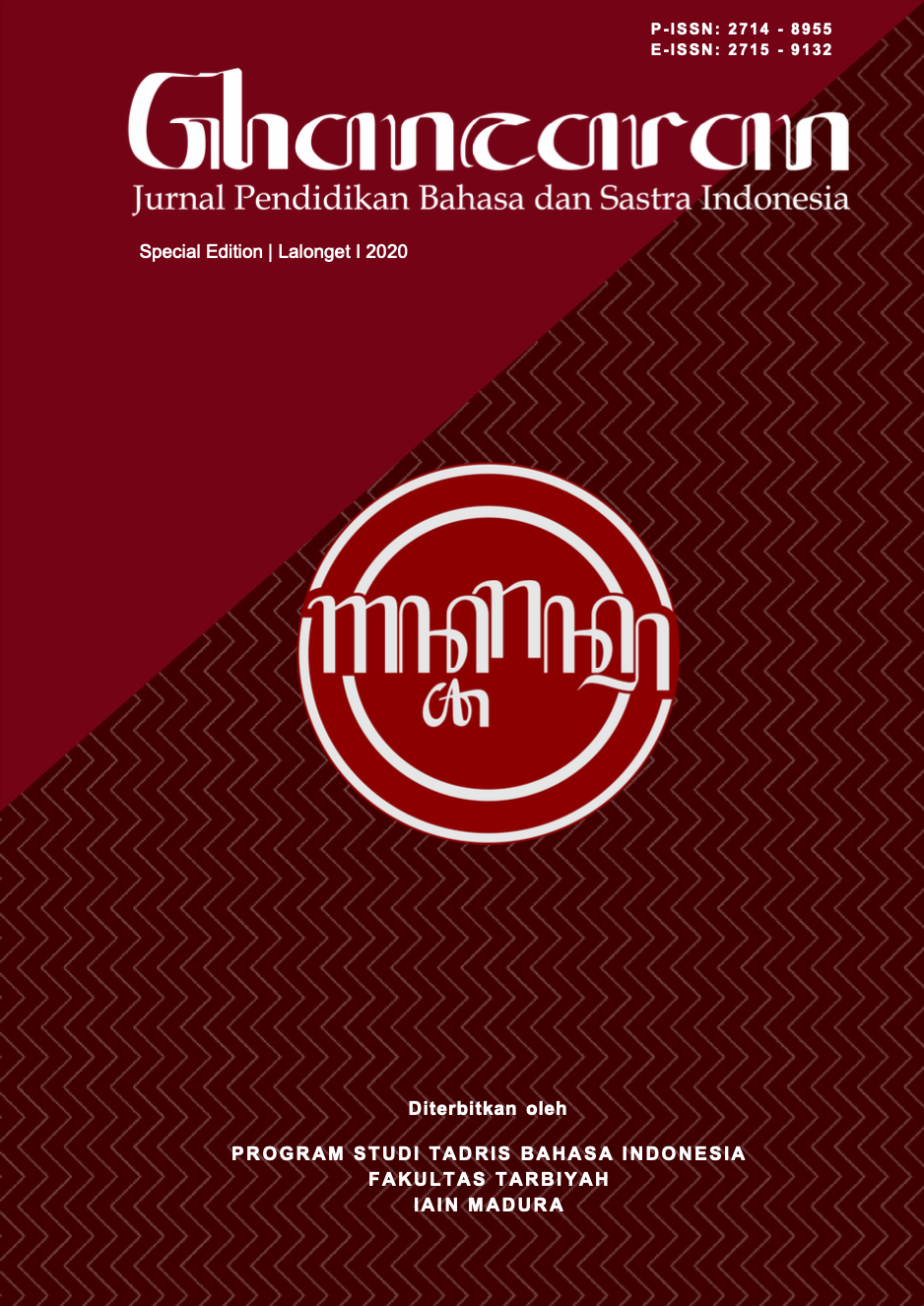ANALISIS PENGGUNAAN VARIASI BAHASA MADURA BANGKALAN PADA KOMUNIKASI INFORMAL SISWA KELAS VIII SMPN 1 KWANYAR BANGKALAN
 Abstract views: 707
,
Abstract views: 707
,
 XML downloads: 636
XML downloads: 636
Abstract
In everyday life, humans need to interact with other people. Conversation is one form of such interaction. Conversations are formed by two or more people. Conversations that occur can be in the form of formal conversations or informal conversations. In the conversation carried out, the language varies from each individual from various regions. This study discusses the variety of language in terms of speakers in class VIII students of SMPN 1 Kwanyar Bangkalan Madura. The uniqueness of this study with other research is that this study discusses the existence of language variations that exist within the district area. Only from one district but able to produce many language variations. The purpose of this study was to describe the variety of language in terms of speakers in informal communication among class VIII students of SMPN 1 Kwanyar Bangkalan Madura. The approach in this research is descriptive qualitative. The data source of this research is the eighth grade students of SMPN 1 Kwanyar Bangkalan Madura. The data in this study were all utterances spoken by grade VIII students of SMPN 1 Kwanyar Bangkalan Madura. Data collection used observation techniques, proficient listening techniques, interview techniques, recording techniques, and note taking techniques. Data analysis techniques using data reduction methods, data presentation, and conclusions. The validity of the data used investigator triangulation. The results showed that in informal communication among eighth grade students of SMPN 1 Kwanyar, there were variations in the language in terms of speakers, there were variations in language based on dialect, idiosyncrasy, gender, and age.
Downloads
References
Budiono, Satwiko. 2015. Variasi Bahasa Di Kabupaten Banyuwangi: Penelitian Dialektologi. Jakarta: Universitas Indonesia.
Chaer, Abdul. 2012. Linguistik Umum. Jakarta: Rineka Cipta
Chaer. Abdul. 2010. Sosiolinguistik Perkenalan Awal. Jakarta: Rineka Cipta.
Devito, JA. 2011. Komunikasi Antarmanusia. Maulana A, Penerjemah. Wahyu YI, Prihantini Y. Tangerang Selatan: Karisma Publishing Group.
Dwi Rias Setiawati. 2019. Variasi Bahasa Dalam Situasi Tidak Formal Pada Mahasiswa Program Studi Pendidikan Bahasa Indonesia Di Universitas Tadulako. Universitas Tadulako.
Hasibuan. 2006. Proses Belajar Mengajar. Bandung: PT Remaja Rosdakarya.
Ibrahim, MA. 2015. Metodologi Penelitian Kualitatif. Bandung: Alfabeta.
Kurniati, Endang. 2010. Pola Variasi Bahasa Jawa (Kajian Sosiodialektologi) pada Masyarakat Tutur di Jawa Tengah. Universitas Negeri Semarang.
Kusuma, Amalia Dewi. 2010. Variasi Bahasa dalam Interaksi Sosial Warga Dukuh Ngares, Desa Kadireso, Kecamatan Teras, Kabupaten Boyolali (kajian sosiolinguistik). Universitas Negeri Semarang.
Leni, Aslinda. 2014. Pengantar Sosiolinguistik. Bandung: PT Refika Aditama.
Mahsun. 2005. Metode Penelitian Bahasa. Jakarta: Raja Grafindo Persada.
Moleong, Lexy J. 2006. Metodologi Penelitian Kualitatif. Bandung: PT Remaja Rosdakarya.
Mulyana, Deddy. 2005. Ilmu Komunikasi: Suatu Pengantar. Bandung: Rosdakarya.
Nababan. 1993. Sosiolinguistik Suatu Pengantar. Jakarta: PT Gramedia Pustaka Utama.
Ramenda D.P. 2013. Variasi Pemakaian Bahasa Pada Masyarakat Tutur Kota Singaraja. Universitas Pendidikan Ganesha.
Rifai, Mien Ahmad. 2007. Manusia Madura. Yogyakarta: Pilar Media
Ruben, Brent dan Lea P Stewart. 2014. Komunikasi dan Perilaku Manusia. Bandung: Rajawali Press.
Sofyan, Akhmad dkk 2008. Tata Bahasa Madura. Sidoarjo: Balai Bahasa Surabaya
Suandi, Nengah. 2014. Sosiolinguistik. Yogyakarta: Graha Ilmu.
Sugioyono. 2016. Metode Penelitian: kuantitatif, kualitatif, dan R&D. Bandung: penerbit Alfabeta.
Sumarsono. 2013. Sosiolinguistik Yogyakarta: Sabda.
Suwito. 1963. Pengantar Awal Sosiolinguistik Teori dan Problema
Ghancaran: Jurnal Pendidikan Bahasa dan Sastra Indonesia uses an Open Access Policy under the Creative Commons Attribution-ShareAlike 4.0 International License. Authors publishing in this journal agree to the following terms:
- Ghancaran Journal holds the copyright and grants the journal rights for first publication with the work simultaneously licensed under a

The work is distributed under Creative Commons Attribution-ShareAlike 4.0 International License which allows others to share, copy, and redistribute the material in any media or format and adapt, remix, change, and develop the material even for commercial purposes, as long as it is stated credit and license derivative works under similar terms. - Authors may make additional contractual arrangements for non-exclusive distribution of the journal's published work version.
- Authors are permitted to post their work online (e.g., in institutional repositories or on their websites) before and during submission, as doing so may lead to productive exchange.



















